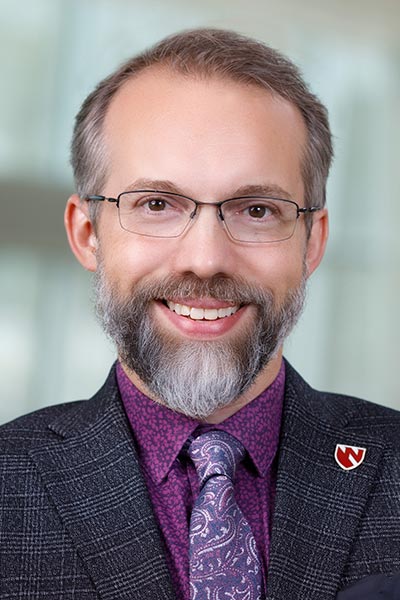The patient experience is not simply a professional interest for this year’s ARP Distinguished Lecturer. It’s been a way of life since he was a toddler diagnosed with rheumatoid arthritis (RA).

“I got started in this field when I was 3 — ready or not — as a patient,” said Kaleb Michaud, PhD, who has been a rheumatology researcher for more than 22 years. “That history goes back a lot further than most, and I bring in some perspectives on what happens in clinical practice and who are the people that the patient interacts with, comparing then versus now.”
Dr. Michaud, Professor in the Division of Rheumatology and Director of the Rheumatology Fellowship Research Program at the University of Nebraska Medical Center, will present From Then to Now to When — Perspectives from 45 Years of Patient Experience with Hope for Tomorrow on Monday, Nov. 13, at 4 p.m. PT in Room 23 A–C of the San Diego Convention Center. The presentation also will be available on demand within 24 hours of the session for registered ACR Convergence 2023 participants.
In the 1980s, it was commonplace for Dr. Michaud, as a patient, to wait in the clinic for up to an hour to see a rheumatologist.
“I didn’t realize that, at the time, it was just because there were so few of them,” he said. “Nowadays, the rheumatologists can’t let patients wait more than five minutes, otherwise they’ll give the physician a bad rating. It’s a very different expectation.”
What a patient can expect during that face-to-face time with a rheumatologist also has evolved, and Dr. Michaud will review rheumatic disease activity measurement development and implementation with an emphasis on patient-reported outcomes, which are becoming standard of care.
Meanwhile, in-clinic grip strength tests, once a mainstay, have fallen by the wayside. The test hasn’t been offered to Dr. Michaud in more than 20 years.
“Some people still talk about it and know that it’s useful, but nobody looks at it,” he noted. “They might look at your feet once in a while, but because there’s no joint count with the feet used in RA anymore, it hardly ever happens.”
Due to varying reimbursement systems and the passion providers bring to caring for patients, different care models exist across the globe. Dr. Michaud will examine how these variances manifest for those living with rheumatic disease.
He also will outline what he hopes the patient experience will look like in the future.
“I’m a big fan of integration. Right now, it feels like a bit of a bad word when it comes to electronic medical record (EMR) data, but my goal is not to overwhelm the interprofessional staff with information that could be included,” Dr. Michaud explained. “My goal is to make it more streamlined, and that is the most important aspect of the visits: The goals of the visit, the goals of the patient, are clearly expressed and made apparent to everybody involved.”
This is critical because of the reduction in the amount of patient interaction time in each visit over the years, he noted.
Dr. Michaud is the 2022 recipient of the ARP President’s Award. A leader in research with patient registries, he is the Director of the Forward Databank, the largest long-term open-cohort observational registry of its kind, and the principal investigator of the RAIN database, a rheumatology clinical registry for Nebraska Medicine. He also is involved in the Veteran Affairs Rheumatoid Arthritis (VARA) registry.
As an active, long-term volunteer for the ACR and ARP, Dr. Michaud was instrumental in the development of the Rheumatology Informatics System for Effectiveness (RISE) registry.
Register Today for ACR Convergence 2025

If you haven’t registered for ACR Convergence 2025, register today to participate in this year’s premier rheumatology experience, October 24–29 in Chicago. All registered participants receive on-demand access to scientific sessions after the meeting through October 31, 2026.
